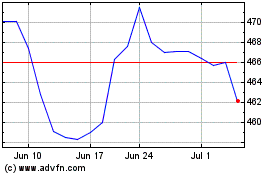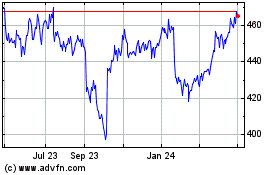By Doug Cameron in Chicago and Ben Kesling in New York
The Pentagon put Turkey on notice that it will cut off Turkish
military pilots from training and halt any Turkish purchases of the
F-35 fighter jet, defense officials said Friday, exerting new
pressure in a widening rift between the two allies.
Acting Defense Secretary Pat Shanahan told his Turkish
counterpart in a memo released Friday that if Ankara makes good on
plans to purchase a Russian antiaircraft system, the U.S. would
take steps to discontinue Turkey's participation in the development
and use of the plane.
The F-35 is by far the world's largest weapons program. Maker
Lockheed Martin Corp. forecasts demand for at least 4,500 of the
radar-evading jets over the course of the program, which analysts
estimate could cost $400 billion.
The letter to Turkish officials increases pressure on the
country to cut ties with Russia on a major defense initiative to
reverse the U.S. decision to end a partnership providing one of the
world's most-advanced fighter jets to the longtime North Atlantic
Treaty Organization ally.
Turkey has been training with Russia and plans to purchase and
field Moscow's S-400 missile system, an advanced surface-to-air
missile developed to shoot down planes like the F-35 that is seen
by NATO forces as a key Russian threat.
"While we seek to maintain our valued relationship, Turkey will
not receive the F-35 if Turkey takes delivery of the S-400," Mr.
Shanahan said in a letter sent Thursday to the Turkish defense
minister that was released publicly on Friday.
The office of Turkish Defense Minister Hulusi Akar confirmed
Saturday that a letter had been sent by Mr. Shanahan.
"The letter expresses the expectation of finding a solution to
the existing problems within the framework of strategic partnership
and maintaining the comprehensive security cooperation and
emphasizes the importance of continuing negotiations," the Turkish
Defense Ministry said in a short statement, which made no direct
mention of the Russian missile or U.S aircraft issues.
The dispute over the S-400 is one of several issues straining
U.S.-Turkey ties. The two countries have been negotiating the
possible creation of a safe zone in Syria along Turkey's border.
And under pressure from the U.S., Turkey has reluctantly cut off
oil deals with Iran.
Mr. Shanahan said Turkey's involvement in the F-35 program will
be frozen by July 31 unless Ankara ends its efforts to buy and
field the Russian system. Mr. Shanahan also sent Mr. Akar a
detailed timeline of how the program would unwind, a stark threat
that included a reminder that nothing has been finalized.
"You still have the option to change course on the S-400," he
said.
Mr. Shanahan laid out the various knock-on effects that he said
would come from fielding the Russian system.
"In addition to threatening the security of platforms like the
F-35, Turkey's procurement of the S-400 will hinder your nation's
ability to enhance or maintain cooperation with the United States
and within NATO, lead to Turkish strategic and economic
over-dependence on Russia, and undermine Turkey's very capable
defense industry and ambitious economic development goals," he
said.
Lockheed Martin oversees a global supply chain and analysts
estimate there is as much as $3 million in Turkish content on each
plane. That would have to be replaced, potentially inflating the
price of the plane just as Lockheed Martin and its partners are
trying to bring the price of the basic model down below $80
million.
Turkey is one of the largest F-35 export customers, with an
order for 100 jets, third behind only the U.K. and Japan. It is one
of eight country partners that joined the F-35 program in 2002,
before years of design and production problems delayed its entry
into service by five years and added billions of dollars in
cost.
Lockheed Martin, which derives around 30% of its sales from the
F-35, has played down the impact Turkey's ejection from the program
would have.
Turkey has received four of the jets so far and is due to secure
an additional eight annually over the next several years. The
defense giant said those purchases can be replaced with potential
new customers such as Singapore and Poland, as well as through
expanded orders from countries including Japan.
"It will be backfilled," said Lockheed Martin Chief Executive
Marillyn Hewson at an investor conference last week. "In fact, a
lot of countries say: 'We'll take their slot.'"
The company expects to deliver 131 jets this year, rising to 160
by 2023. It didn't immediately respond to a request for
comment.
Local suppliers such as Turkish Aerospace Industries produce
major parts for the plane, including a joint venture with Northrop
Grumman Corp. to make the center fuselage. The Pentagon said it is
developing alternative suppliers, but these can take time to
certify and could interrupt or raise the cost of producing future
jets.
Turkey has also been chosen to provide maintenance and repair
services for itself and U.S. allies flying the jets, especially for
the engines made by the Pratt & Whitney unit of United
Technologies Corp.
Mr. Shanahan's actions aren't occurring in a vacuum. The Senate,
which is working on the annual defense policy bill, the National
Defense Authorization Act, included bipartisan-supported language
to end the F-35 relationship if Turkey takes delivery of the
S-400.
"The language essentially says in no uncertain terms that there
won't be F-35s sent to Turkish territory if they buy the S-400," a
Senate staffer said. "And they will be required to certify that
they won't do so in the future." another staffer said.
While the House hasn't released final language on their
authorization bill, similar terms are expected, according to people
familiar with the matter.
The U.S. and other NATO allies want Turkey to instead buy the
Patriot radar system made by Raytheon Co.
Write to Doug Cameron at doug.cameron@wsj.com and Ben Kesling at
benjamin.kesling@wsj.com
(END) Dow Jones Newswires
June 08, 2019 05:03 ET (09:03 GMT)
Copyright (c) 2019 Dow Jones & Company, Inc.
Lockheed Martin (NYSE:LMT)
Historical Stock Chart
From Mar 2024 to Apr 2024

Lockheed Martin (NYSE:LMT)
Historical Stock Chart
From Apr 2023 to Apr 2024
